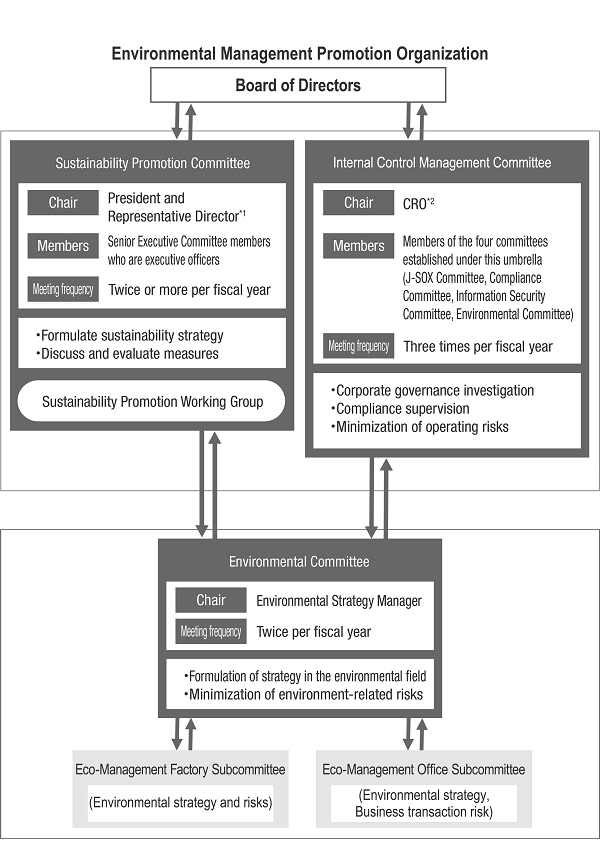Information Disclosure Based on TNFD Recommendations: Governance
The information disclosed on the website is a digest. For details, please refer to the TNFD Report (PDF format, 1.45 MB).
Environmental Management Promotion Organization
With the aim of strengthening environmental management and promoting effective environmental activities throughout the Hitachi High-Tech Group, we have established the organization shown in the figure below promote environmental management.
Initiatives for Materiality
Contributing to a Sustainable Global Environment is one of the materiality for the Group. We formulate proposals and plans for policies and specific plans for (1) Realize a decarbonized society, (2) Realize recycling-oriented society, and (3) Realize a society in harmony with nature. To achieve those, we evaluate performance from each site and use the findings for further contributions. In addition, important matters relating to environmental strategy are discussed by the Sustainability Promotion Committee, which is chaired by the President and has directors and executive officers on its members.
Initiatives for Strategies for Nature-related Issues
The Sustainability Promotion Committee meets at least twice a year to discuss the formulation and implementation of our sustainability strategies, including environmental strategies that include nature-related risks.
Important matters discussed by the Sustainability Promotion Committee are reported to the Board of Directors at least once a year, and the feedback is utilized in sustainability promotion tasks.

*1 President and Representative Director: The President and Representative Director serves as Chair of the Sustainability Promotion Committee, which has senior management as its members and has the duty of working to promote activities related to sustainability, including climate-related matters.
*2 CRO: The Chief Risk Management Officer (CRO) is the general manager in charge of risk across the entire company, and as Chair of the Internal Control Supervisory Committee is responsible for minimizing operating risks, including environmental risks, and for establishing an emergency response system.
Human Rights Policy
In April 2014, the Group formulated the Hitachi High-Tech Group Human Rights Policy. This policy clearly states that we support the International Bill of Human Rights and the International Labour Organization (ILO) Declaration on Fundamental Principles and Rights at Work. It stipulates that the Group will conduct human rights due diligence*3 and provide appropriate education based on the UN Guiding Principles on Business and Human Rights, and will comply with the laws and regulations of the regions and countries where we do business. Furthermore, it states that where there is a conflict between internationally accepted standards of human rights and domestic law, we will pursue the approach that respects international principles of human rights. Based on this policy, we respect not only the human rights of Group employees, but also those of all stakeholders through the Group's business activities and our products and services.
Based on the aforementioned human rights policy, the Group recognizes the importance of the traditional territories, knowledge, and customs of indigenous peoples and local communities as a response to the global challenge of halting and restoring nature loss, particularly with regard to nature-related dependencies, impacts, risks, and opportunities. If stakeholders (such as local residents and indigenous peoples with rights to natural resources and lands) whose human rights may be exposed to risks by our business activities are identified, we recognize them as rights holders who can have an appropriate standard of living and a sustainable environment, and we respect their human rights.
Engagement with Stakeholders
Our Group aims to be a successful enterprise trusted by all our stakeholders and contributing to social progress through business activities that emphasize value creation through high-tech solutions. We are committed to open, transparent, and reliable business practices. As we continue to grow, we will value the environment and strive to build a prosperous community, fulfilling our social responsibility and contributing as a corporate citizen with passion and pride in our work.
Our Group, we are working to promote communication with our stakeholders through information disclosure regarding environmental activities and staff participation in volunteer activities, etc. We consider it important to give our stakeholders an even more readily understandable explanation than before of the effects our own business activities have on the environment. We also think it crucial that we earn an understanding and empathetic response from stakeholders by continuing the cumulative two-way communication of our employees' volunteer activities.
Our Group is working to promote communication with our stakeholders through information disclosure by issuing Materiality Book and disclosing environmental information online, allowing business site visits and observations, and responding to external surveys.
In addition, environmental sections are created during the Naka Area Midsummer Festival and the Hitachi High-Tech Science Fuji Oyama Works Summer Festival (for both events, the business sites are opened to the public to deepen relationships with local residents). At the environmental section, we deepen relationships through introducing our environmental conservation activities in this area and conduct an environment quiz.
Thus, in accordance with the Hitachi Group Code of Ethics and Business Conduct and the Hitachi High-Tech Group Human Rights Policy, in assessing and responding to the organization's nature-related dependencies, impacts, risks, and opportunities, the Group conducts appropriate engagement with indigenous peoples, local communities, affected stakeholders, and all other stakeholders. In addition, a framework has been established to address complaints and suggestions from stakeholders in accordance with a grievance mechanism, which includes such information and is subject to oversight by the Board of Directors and senior management.
*3 Human rights due diligence: Involves identifying, assessing, and responding to business-related human rights impacts, taking measures to prevent, mitigate, and remedy negative impacts, then continuously verifying and disclosing the effectiveness of these measures.
